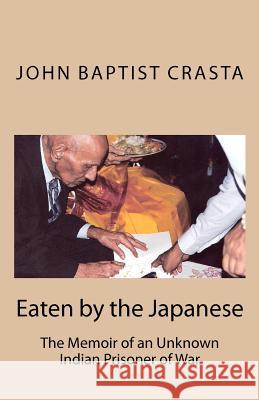Eaten by the Japanese: The Memoir of an Unknown Indian Prisoner of War » książka
Eaten by the Japanese: The Memoir of an Unknown Indian Prisoner of War
ISBN-13: 9781480034051 / Angielski / Miękka / 2012 / 120 str.
Eaten by the Japanese: The Memoir of an Unknown Indian Prisoner of War
ISBN-13: 9781480034051 / Angielski / Miękka / 2012 / 120 str.
(netto: 37,82 VAT: 5%)
Najniższa cena z 30 dni: 39,61
ok. 16-18 dni roboczych
Dostawa w 2026 r.
Darmowa dostawa!
"Eaten by the Japanese" is the inspiring World War II memoir of an Indian soldier in the British Indian Army--a rare surviving account from among the thousands of Indians who were trapped in World War II, suffered, and lost their lives. Captured by the Japanese when Singapore fell, taking a moral decision not to trust the Japanese or to desert to the Japanese-sponsored Indian National Army, he is taken to Rabaul in New Britain (Papua New Guinea) in a "torture ship," he miraculously survives 3 1/2 years of inhuman treatment by his Japanese captors and bombardment by Allied planes. Rescued by Australians, he returns home to India and writes this memoir in 1946, which also refers to incidents of cannibalism. He then waits another 51 years before his memoir, written in pencil, is read and published by his son, Richard Crasta, who by then is an author living in the United States. In the process of reading this book, the once-estranged son rediscovers his father, adding his own Notes and three essays to the book, which he publishes and presents to his 87-year-old father on the latter's 50th wedding anniversary. "More than any book in recent memory, Eaten by the Japanese drives home the lasting effects of enforced captivity - not only on the bodies but also on the minds of the prisoners . . . it is a book about kindness, solidarity, and collective survival, about the bonds that matter: those between one single human being and another. Not a mere story of self but an epic of collective agony. "--Professor Barry Fruchter. "A classic in military history, telling the story of men trapped in a world of torture, starvation, and death"-Roger Mansell, War historian, in Tameme Magazine "You see the horror of war, without a trace of artifice, through the eyes of one who was there, the writing a simple act of catharsis. A war memoir that ranks with the best."-Professor Mark Ledbetter, Nisei University "Striking and raw, an antidote to myth. Something to be treasured. It made me think of what had happened to my own father's memoirs, which were lost."--Professor Barry Fruchter.
Zawartość książki może nie spełniać oczekiwań – reklamacje nie obejmują treści, która mogła nie być redakcyjnie ani merytorycznie opracowana.











